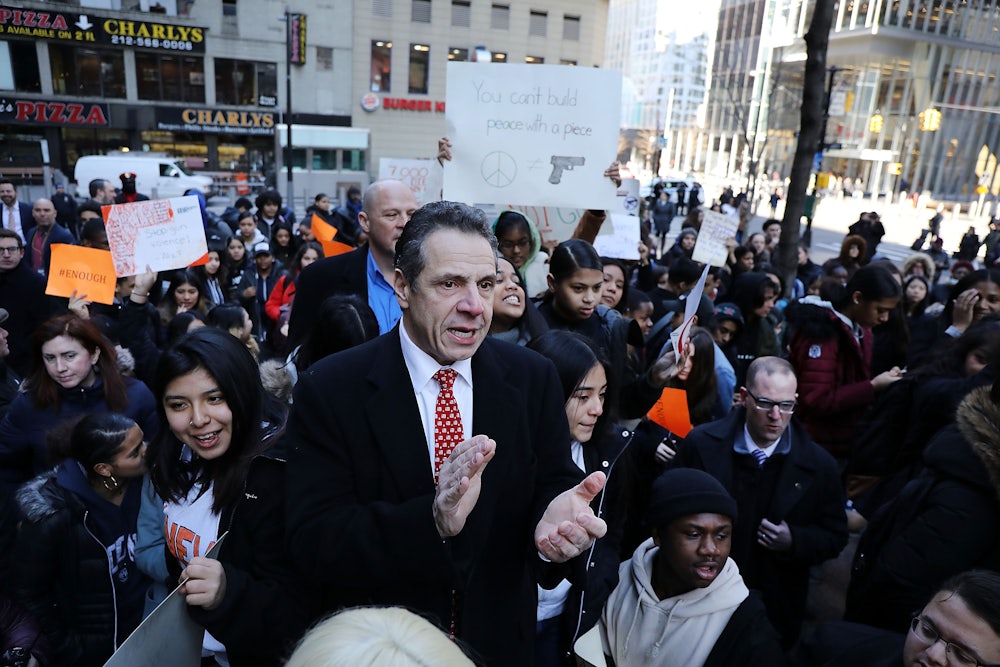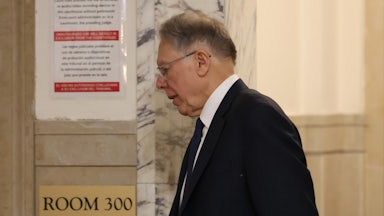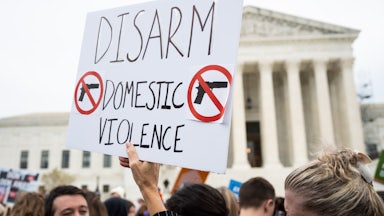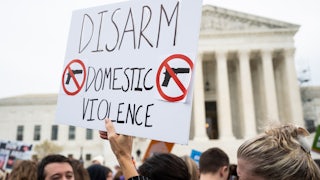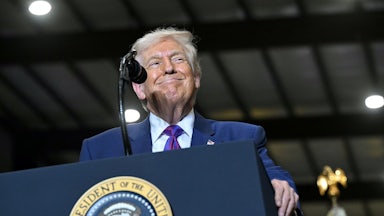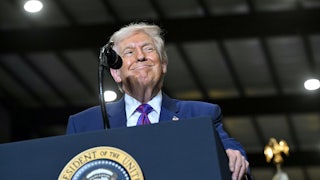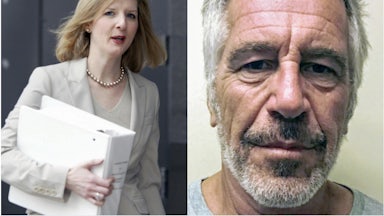The Supreme Court has sided with the National Rifle Association on Second Amendment issues from time to time. Now the court appears ready to side with them on the First Amendment as well.
In Monday’s oral arguments in NRA v. Vullo, the justices appeared ready to side with the gun rights organization on part of its ongoing legal battles against New York officials. The beleaguered advocacy group claimed that the state’s Department of Financial Services violated its First Amendment rights in 2018 when it mounted a pressure campaign to induce banks and insurers to stop working with the NRA.
By the end of the arguments, it was clear that whatever uncertain winds were swirling at the outset had shifted decidedly in the NRA’s favor. “You say, in your brief, this case is not even close,” Justice Samuel Alito asked Neil Katyal, the lawyer representing Vullo. “Do you stand by that?” Katyal replied that he did. When David Cole, the NRA’s lawyer, began his rebuttal, he quipped, “So I agree with my friend on one point: This case is not close.” This time, the courtroom laughed.
A victory for the NRA in Vullo is not going to rescue it from its myriad problems: New York Attorney General Letitia James is seeking the organization’s dissolution in another legal battle, and its ex-leader Wayne LaPierre was found liable last month in a civil corruption case for his handling of the group’s finances. Whether the NRA gets to enjoy the fruits of a favorable decision notwithstanding, the ruling could go a long way in providing other disfavored advocacy groups with stronger protections against ham-fisted attempts by state officials to stamp them out.
The original dispute began in 2017, when the NRA launched its Carry Guard insurance program, whose policies offered up to $1 million in coverage for legal costs for qualifying gun owners in gun-related cases. That coverage could apply, to varying degrees, to both civil litigation and criminal defenses. “Without insurance, lawful self-defense can cost you a fortune,” read the tagline on the program’s now-defunct website.
Financial regulators in New York soon flagged issues with the program. Carry Guard policies were sponsored by Lockton Affinity and underwritten by Chubb, one of the largest insurance companies in the world. Both companies do business in New York, where a disproportionate amount of the nation’s financial infrastructure is located. Among other issues, state law forbids insurance companies from providing insurance for criminal defenses. New York’s Department of Financial Services, also known as DFS, ultimately issued a $7 million fine against Lockton in 2019. Amid scrutiny in other states, the NRA wound down the Carry Guard program after Lockton declined to reoffer it and Chubb refused to underwrite future iterations.
In 2018, the NRA also came under heavy criticism after a school shooting in Parkland, Florida, where 18 students died. One of its critics was Maria Vullo, New York’s superintendent of financial services. Vullo, in her official capacity as the head of DFS, sent a guidance memorandum to the state’s financial institutions “on risk management relating to the NRA and similar gun promotion organizations.” It described how corporate policies on social responsibility might apply to gun violence and—by extension, in Vullo’s view—to the NRA.
“In light of the above, and subject to compliance with applicable laws, the Department encourages its insurers to continue evaluating and managing their risks, including reputational risks, that may arise from their dealings with the NRA or similar gun promotion organizations, if any, as well as continued assessment of compliance with their own codes of social responsibility,” Vullo wrote. “The Department encourages regulated institutions to review any relationships they have with the NRA or similar gun promotion organizations, and to take prompt actions to manag[e] these risks and promote public health and safety.”
Vullo’s memo was accompanied by a press release by Andrew Cuomo, who was the governor of New York at the time. Cuomo said he had “directed” the department to “review any relationships they may have with the National Rifle Association and other similar organizations.” That press release also quoted Vullo as saying that “DFS urges all insurance companies and banks doing business in New York to join the companies that have already discontinued their arrangements with the NRA, and to take prompt actions to manage these risks and promote public health and safety.”
Shortly thereafter, the NRA sued Vullo, Cuomo, and DFS for, among other things, violating its First Amendment rights. The group claimed it had found itself unable to work with banks, insurers, and other financial institutions in New York after the memos on a variety of matters, allegedly out of fear that state financial regulators would retaliate against them or scrutinize them more closely. That, in turn, made it harder for the NRA to carry out its constitutionally protected advocacy goals.
That the NRA would interpret these actions as unconstitutional threats is hardly surprising. Back in 2018, I described Cuomo’s campaign against the organization as Trumpian in nature for its bluntness and heavy-handedness. Even for an issue as emotionally charged as gun violence, Cuomo’s messaging about the NRA stood out as particularly venomous. “The NRA is an extremist organization,” Cuomo wrote on Twitter at the time. “I urge companies in New York State to revisit any ties they have to the NRA and consider their reputations, and responsibility to the public.”
To support its legal arguments, the NRA pointed to a 1963 Supreme Court case involving government censorship through private intermediaries. In Bantam Books v. Sullivan, a group of publishers challenged a Rhode Island commission that reviewed books under the state’s obscenity laws at the time. The commission voted on whether certain books or magazines were considered “objectionable” to the state’s youth, then sent lists of disapproved books to distributors. The lists included a not-so-subtle suggestion that selling the books in Rhode Island would lead to prosecution by local police departments.
The 8–1 decision held that the commission’s actions violated the First and Fourteenth Amendments. Justice William Brennan, writing for the court, concluded that the state’s approach to censorship amounted to prior restraint on publishing activities. He also described the commission as an end run of sorts around the criminal justice system, where obscenity defendants could at least enjoy the “safeguards” of their constitutional rights.
“The commission’s notices, phrased virtually as orders, reasonably understood to be such by the distributor, invariably followed up by police visitations, in fact stopped the circulation of the listed publications [by its own force],” he wrote. “It would be naive to credit the State’s assertion that these blacklists are in the nature of mere legal advice when they plainly serve as instruments of regulation independent of the laws against obscenity.”
Cole, who argued on behalf of the NRA, told the court that his client faced similarly coercive conduct. He pointed in particular to an allegation by the NRA that New York officials had urged Lloyd’s, the global insurance behemoth, to refuse to do business with the group in exchange for more favorable treatment in other cases. “This is about a square-corners Bantam Books case as you can imagine,” Cole, who is also the national legal director for the American Civil Liberties Union, told the justices.
Katyal, for his part, tried to emphasize that the NRA had broken state laws and the state had treated it accordingly. “They were selling intentional criminal act insurance, and all of the products they offered were unlawful because the NRA refused to get a license,” he said in his opening remarks. “That’s why Bantam Books is miles away from this case, and it’s why the court below found qualified immunity protects Vullo.” (While lower courts had applied qualified immunity in the case in Vullo’s favor, it played nearly no role in the justices’ arguments on Monday.)
The conservative justices appeared to be unpersuaded by his defense. At one point, Alito used a blunt analogy to undercut Katyal’s argument. “Suppose the allegation was [they] had a meeting with Ms. Vullo and she pulled out a pistol and she held it to [their] heads, and she said I’m going to blow your brains out unless you stop writing insurance for the NRA,” he told Katyal. “That would not be enough to even allege a Bantam Books violation because she might have taken that same regulatory action for a perfectly legitimate reason.”
While Vullo remains in office, Cuomo does not. He resigned in 2021 to avoid impeachment and removal by the state legislature over sexual harassment allegations against him. The long shadow of his Trump-like approach to suppressing the NRA endures, however, and it appears likely to hand the state a significant legal defeat. New Yorkers will learn just how much their former governor’s overheated rhetoric and ham-fisted tactics will backfire when the court hands down a ruling by the end of June.
